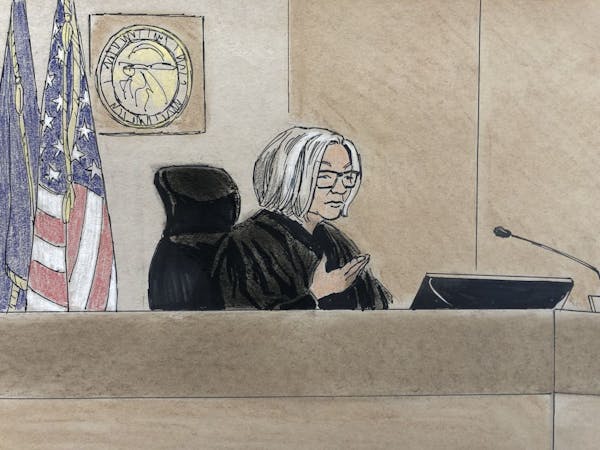A coalition of Minnesota media outlets is asking Hennepin County Chief Judge Ivy Bernhardson to reconsider courtroom limitations it says will hinder the ability to report on the high-profile trial of Mohamed Noor, a former Minneapolis police officer charged with murder, which begins Monday.
Earlier this week, Judge Kathryn L. Quaintance issued an order setting the trial in a small courtroom with eight seats reserved for reporters. Citing a need to preserve "decorum and order," Quaintance also banned laptops, cellphones and recording devices from the floor on which the proceedings will take place.
"The Coalition is dismayed that, on the eve of trial, uncertainties remain about whether the press and public will be able to adequately monitor one of the highest profile trials the State of Minnesota has ever seen," wrote attorney Leita Walker on behalf of the Star Tribune, Minnesota Public Radio, CBS Broadcasting, Tegna and Fox/UTV Holdings.
Walker asks Bernhardson to move the trial to a larger courtroom or set aside an overflow room for press to watch the video feed where electronics are permitted.
The letter also raises concerns about a passage in Quaintance's order stating reporters can't seek interviews from attorneys, witnesses or jurors involved in the case, which Walker says could amount to unconstitutional prior restraint. "This is a vague and ambiguous statement that, coupled with the threat of sanctions in the order, threatens to chill the exercise of free speech rights under the First Amendment," she wrote.
The media coalition requested a meeting with Bernhardson to discuss a plan allowing for meaningful access to the trial.
Bernhardson addressed the complaint about the courtroom size in a letter to the Star Tribune on Thursday: "This courtroom provides [Quaintance] ready access to her staff and chambers, which is vital to her smooth handling of this high-profile case, and it also provides a high level of judicial security and safety."
Quaintance announced further restrictions Friday, including that media and the public will not be allowed to watch body camera footage when it's played in court, citing privacy concerns. A sketch artist may be prohibited from drawing jurors.
"This is a de facto closing of the courtroom and it should not occur before the media is given a meaningful opportunity to be heard," Walker wrote.
Members of the public and media who can't get seats in the courtroom can watch a video feed from a nearby courtroom, but will not be allowed electronics, and Quaintance authorized security to search people to make sure they comply.
In her letter, Walker cites the contrast between media restrictions in the Noor trial and the Wisconsin hearing in which Jake Patterson pleaded guilty to kidnapping a 13-year-old girl and murdering her parents. In that case, the courts livestreamed the proceedings.
In an interview, Walker said members of the media coalition take seriously the constitutional right to a fair trial, but ask the judge to also give proper deference to the press's First Amendment rights when creating rules for the trial.
"This is a trial of utmost interest and concern to the public," she said. "It's vital that the press and public have access." If the judge's rules prohibit that, said Walker, "this media coalition, I think, will be carefully considering all options under the constitution."
Andy Mannix • 612-673-4036

How Minnesota House Republicans ended the DFL's state government trifecta
Project 2025 platform proposal aims to allow mining in Boundary Waters watershed

Ann Johnson Stewart wins special election, giving DFL control of Minnesota Senate

Democratic U.S. Sen. Amy Klobuchar defeats GOP challenger Royce White

